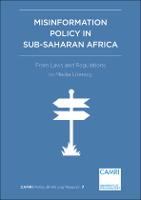Misinformation Policy in Sub-Saharan Africa
From Laws and Regulations to Media Literacy
| dc.contributor.author | Diagne, Assane | |
| dc.contributor.author | Finlay, Alan | |
| dc.contributor.author | Gaye, Sahite | |
| dc.contributor.author | Gichunge, Wallace | |
| dc.contributor.author | Pretorius, Cornia | |
| dc.contributor.author | Schiffrin, Anya | |
| dc.contributor.author | Cunliffe-Jones, Peter | |
| dc.contributor.author | Onumah, Chido | |
| dc.date.accessioned | 2021-07-23T15:11:31Z | |
| dc.date.available | 2021-07-23T15:11:31Z | |
| dc.date.issued | 2021 | |
| dc.identifier | ONIX_20210723_9781914386053_14 | |
| dc.identifier | OCN: 1264153942 | |
| dc.identifier.issn | 2752-6240 | |
| dc.identifier.uri | https://library.oapen.org/handle/20.500.12657/50175 | |
| dc.description.abstract | Misinformation Policy in Sub-Saharan Africa is a single volume containing two research reports by eight authors examining policy towards misinformation in Sub-Saharan Africa. The volume first examines the teaching of ‘media literacy’ in state-run schools in seven Sub-Saharan African countries as of mid-2020, as relates to misinformation. It explains the limited elements of media and information literacy (MIL) that are included in the curricula in the seven countries studied and the elements of media literacy related to misinformation taught in schools in one province of South Africa since January 2020. The authors propose six fields of knowledge and skills specific to misinformation that are required in order to reduce students’ susceptibility to false and misleading claims. Identifying obstacles to the introduction and effective teaching of misinformation literacy, the authors make five recommendations for the promotion of misinformation literacy in schools, to reduce the harm misinformation causes. The second report in the volume examines changes made to laws and regulations related to ‘false information’ in eleven countries across Sub-Saharan Africa 2016-2020 from Ethiopia to South Africa. By examining the terms of such laws against what is known of misinformation types, drivers and effects, it assesses the likely effects of punitive policies and those of more positive approaches that provide accountability in political debate by promoting access to accurate information and corrective speech. In contrast to the effects described for most recent regulations relating to misinformation, the report identifies ways in which legal and regulatory frameworks can be used to promote a healthier information environment. | |
| dc.language | English | |
| dc.relation.ispartofseries | CAMRI Policy Briefs and Reports | |
| dc.subject.classification | thema EDItEUR::G Reference, Information and Interdisciplinary subjects::GT Interdisciplinary studies::GTC Communication studies | en_US |
| dc.subject.classification | thema EDItEUR::N History and Archaeology::NH History::NHH African history | en_US |
| dc.subject.classification | thema EDItEUR::D Biography, Literature and Literary studies::DN Biography and non-fiction prose::DNP Reportage, journalism or collected columns | en_US |
| dc.subject.classification | thema EDItEUR::J Society and Social Sciences::JB Society and culture: general::JBC Cultural and media studies::JBCT Media studies | en_US |
| dc.subject.classification | thema EDItEUR::U Computing and Information Technology::UD Digital Lifestyle and online world: consumer and user guides::UDV Digital TV and media centres: consumer / user guides | en_US |
| dc.subject.classification | thema EDItEUR::L Law::LN Laws of specific jurisdictions and specific areas of law::LNJ Entertainment and media law | en_US |
| dc.subject.other | Information regulation | |
| dc.subject.other | Africa | |
| dc.subject.other | Fact-checking | |
| dc.subject.other | Media Literacy | |
| dc.subject.other | News | |
| dc.subject.other | Misinformation | |
| dc.title | Misinformation Policy in Sub-Saharan Africa | |
| dc.title.alternative | From Laws and Regulations to Media Literacy | |
| dc.type | book | |
| oapen.identifier.doi | 10.16997/book53 | |
| oapen.relation.isPublishedBy | 2725c638-53f3-4872-9824-99c3555366f3 | |
| oapen.relation.isbn | 9781914386053 | |
| oapen.relation.isbn | 9781914386060 | |
| oapen.relation.isbn | 9781914386077 | |
| oapen.imprint | University of Westminster Press | |
| oapen.series.number | 8 | |
| oapen.pages | 224 | |
| oapen.place.publication | London |

